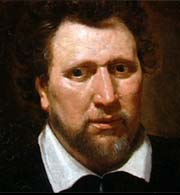O Rare Ben Jonson

As between his beloved pal Shakespeare and himself, Ben Jonson was in his day heralded as the finer artist of his generation -- perhaps because it was known that he was self-consciously involved in the creation of Art with a capital "A" unlike his rough-and-tumble friend. Jonson's assessment of Shakespeare's work ("Would he had blotted out a thousand [lines]") is instructive: although Jonson's life was certainly wild and woolly, his interest was in infusing his writing with classical virtues -- balance, formality, restraint -- in an effort to civilize and tame the "humours" of his age.
Born on this day in 1572 in London, his father (a Protestant minister) died before he was born, and he was raised by his mother and his bricklaying step-father. After a pretty good classical education at the Westminster School (thanks to an anonymous sponsor), he briefly entered his step-father's trade and then served in the military before becoming an actor and hack-writer.
A hard-drinking, hard-playing fellow, Jonson was briefly imprisoned for writing a "lewd" and "seditious" play (The Isle of Dogs, 1597, with Thomas Nashe) and shortly afterwards was again arrested, this time for killing actor Gabriel Spenser in a duel. He narrowly escaped execution for the crime, and while in prison converted to Catholicism (a fad which stuck with him for 12 years). He hit his stride as a playwright with his first solo effort, Every Man in his Humour (1598), which premiered with Shakespeare in the cast, and its sequel, Every Man out of his Humour (1599). The latter play was the first of several in which Jonson included satirical portraits of playwrights John Marston and Thomas Dekker, after Marston had attacked Jonson in his play Histriomastix. The "War of the Theatres" continued for a few plays until Jonson turned his attention to tragedy, based on models from antiquity, notably in Sejanus (1603).
With James I's accession to the throne, Jonson started writing lighthearted masques (with occasionally dark undertones) for the court, working with architect Inigo Jones on sets. He patched up his quarrels with Marston and Dekker and even collaborated with them; when James I found Eastward Ho (1605, co-written with Marston and George Chapman) offensive to the Scots, he imprisoned Marston and Chapman, and Jonson voluntarily joined them out of solidarity. Jonson's 5 comedies from this period -- Volpone, or the Fox (1605), Epicene, or the Silent Woman (1609), The Alchemist (1610), Bartholomew Fair (1614) and The Devil is an Ass (1616) -- are considered to be his masterpieces; full of the mischief and color and vitality of his time, Jonson gives his topical circuses an angle of moral instruction and civilizing reason.
Throughout this period until the end of his life, particularly as James' poet laureate, poetry provided an ideal canvas for his classical palette; Jonson's verse is graceful, masculine and controlled, especially by contrast to the excesses of contemporary love poets, as exemplified in his famous poem "To Celia" (which begins "Drink to me, only, with thine eyes"). In 1619, he walked from London to Scotland (buying a new pair of shoes in Darlington) and stayed for a time with poet William Drummond. Although he continued to write in later years, he exercised more influence as elder statesman of English letters, presiding over meetings of his "sons" in authorship at the Mermaid Tavern and giving weight by his presence to the notion of literature as a profession.
At the end, he was bed-ridden from a stroke, living at Westminster with a drunken servant and a pet fox. He died in 1637, and he was buried standing up in Westminster Abbey, with the inscription "O Rare Ben Jonson" added to his comically small, square tomb-slab almost as an after-thought at the behest of a passing admirer.
Labels: Literature, Shakespeare, Theater





0 Comments:
Post a Comment
Subscribe to Post Comments [Atom]
<< Home